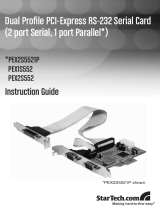
5
3. If the Hardware Installation window pops up, click “Continue Anyway”;
click “Finish.” (The driver’s been tested for stability and compatibility.)
4. Repeat steps 1-3.
5. Restart Windows to complete the installation.
Windows Vista
1. At the Found New Hardware Wizard, select “Locate and install driver
software (recommended).”
2. Click on “I don’t have the disc. Show me other options.”
3. Select the option “Browse my computer for driver software (advanced).”
4. Insert the driver CD; check “Include subfolders”; enter “D:\PCI_IO\
nm9xxx\Vista32” for Vista 32-bit or “D:\PCI_IO\nm9xxx\Vista64” for
Vista 64-bit; click “Next.” NOTE: Change “D:” if/as needed to match
your CD-ROM driver designation.
5. If the system prompts you that the drivers are not signed, select the
option “Install this driver software anyway.”
6. Click “Close” to complete the driver installation.
Verify Windows Driver Installation
1. Right-click “My Computer”; click “Manage”; click “Device Manager.”
2. Click on “+” (plus sign) in front of “Ports (COM & LPT)”; two “MosChip
PCI Parallel Port …” listings should be displayed.
3. Double-click “Multifunction adapters”; “MosChip PCI Multi-I/O
Controller” should be displayed.
Change the Parallel Port Address
Some parallel devices need a specic parallel port in order to work. If
your parallel devices work properly, do not change these settings.
1. In the Device Manager window, double-click “Ports (COM & LPT)”;
then double-click the “MosChip PCI Parallel Port” listing.
2. On the Port Settings tab, click the down arrow and select an LPT
port that is not in use.
3. Click “OK”; then close the Device Manager to save the changes.
5








